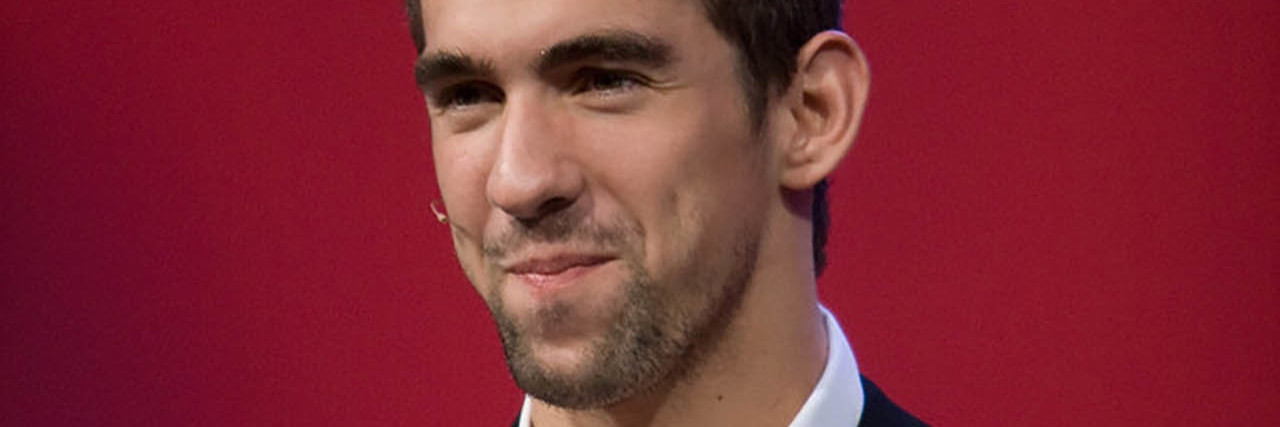Sometimes the news isn’t as straightforward as it’s made to seem. Sarah Schuster, The Mighty’s mental health editor, explains what to keep in mind if you see this topic or similar stories in your newsfeed. This is The Mighty Takeaway.
In new documentary about anxiety, “Angst,” Olympic swimmer Michael Phelps talks to a young fan about anxiety, keeping your feelings inside and what finally helped him feel better. It’s rare to see a man, let alone an athlete, get so candid about mental health — so this is our official invitation to other anxious men to do the same.
Phelps, in a clip from the documentary, starts by telling his own story.
I just didn’t like who I was. If something was bothering me… and I was angry or depressed or upset, I would almost ignore it. So I would shove it even farther down — so I wouldn’t have to deal with it, so I never had to talk about it. Once I opened up about that, and things that I had kept inside of me for so many years, I then found that life was a lot easier, I got to the point where, I understood that it’s OK to not be OK.
This isn’t the first time Phelps, who holds 28 Olympic metals, has spoken up about mental health. After being awarded a special recognition award at the Substance Abuse and Mental Health Services Administration’s (SAMHSA) Children’s Mental Health Awareness Day event, he said in a press call, “For me, for so long, I was so afraid to ever ask for help and I found myself at a very low dark place and I was finally able to realize that I needed help. Finally I understood I cannot do it alone and for me, I needed somebody else to help me go through some of the hard times I was going through.”
While women are twice as likely to have an anxiety disorder than men, according to the National Institute of Mental Health, men are less likely to talk about their feelings and ask for help. It seems more “manly” — and more acceptable — to push these feelings down, as Phelps did. If a young boy never sees an adult figure getting vulnerable or talking about anxiety, it makes sense they would do the same.
And the stakes are real — and high. Men die by suicide 3.5 times more often than women.
As Brandon Marshall, an NFL player who’s open about his borderline personality disorder, said, “One out of four of us are affected by mental illness at some point in our lives, yet near two-thirds of us will never seek help — especially men. We pride ourselves on courage and the ability to never show weakness, but mental health touches us all.”
We need more men who are willing to talk about anxiety. We need more men who will look their sons in the eyes and say, “I don’t feel well right now, and that’s OK.” No longer can men be stoic, silent figures who hold their pain inside. We need more examples of men who are able to get real.
In a powerful piece about being a “man” and asking for help, Mighty contributor Sean Henfling wrote:
I didn’t ask for help. I couldn’t. An independent man doesn’t need help. A real man doesn’t call for or accept help. I couldn’t believe there was anything in my life I couldn’t do alone. Mistakes were equally unacceptable and I demanded perfection of myself. Too heavy to lift? Watch me. I didn’t need anybody for anything. Admitting otherwise was to admit I was less a man, and the very definition of who I was would suffer. In retrospect, it’s no wonder I became such an emotionally stunted and broken person.
I can’t remember a time, even as a child, when my pride would allow me to ask for help. Through school and into college, I didn’t need it. Helping others was perfectly OK. Getting help for myself was admitting a level of defeat I couldn’t bear to shoulder. When I’d find something I struggled with (like long division in fourth grade), I acted out in frustration.
My parents are not to blame. Somehow I internalized this version of what it takes to be a man, that real men found a way to get it done no matter the consequences and whatever it was. My dad is a good man and didn’t display the ‘go it alone’ attitude I do. If not directly from him, then where did I get it?
Where did he get it? The possibilities are endless (see: movies, TV, gender roles, the patriarchy) — but athletes like Phelps and Marshall, writers like Henfling and even members of the royal family are doing their part to change the narrative, so no young boy ever feels like they’re not allowed to ask for help. You’re expected to talk to young boys about puberty. Maybe you get through an awkward conversation about sex (and consent!). Consider adding mental health to this “essential conversations” list.
In the mean time, check out some Mighty men who write about anxiety. We’re also always looking for more male writers, so if you’re interested, share your story with us here.
You can watch the full clip from the documentary below:
Lead photo via “Angst”
Image via Creative Commons/plαdys

